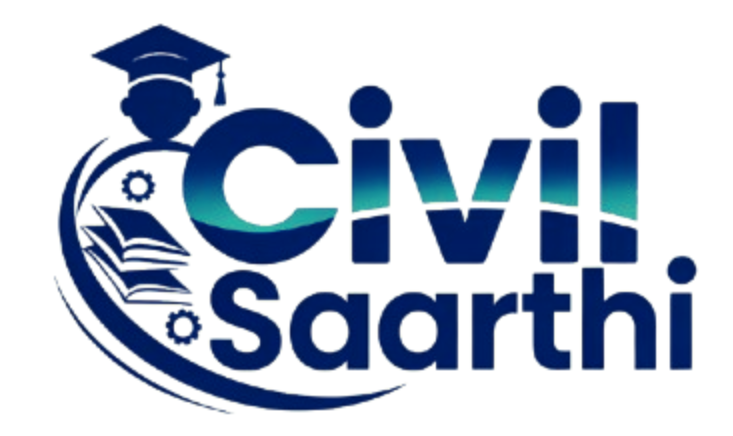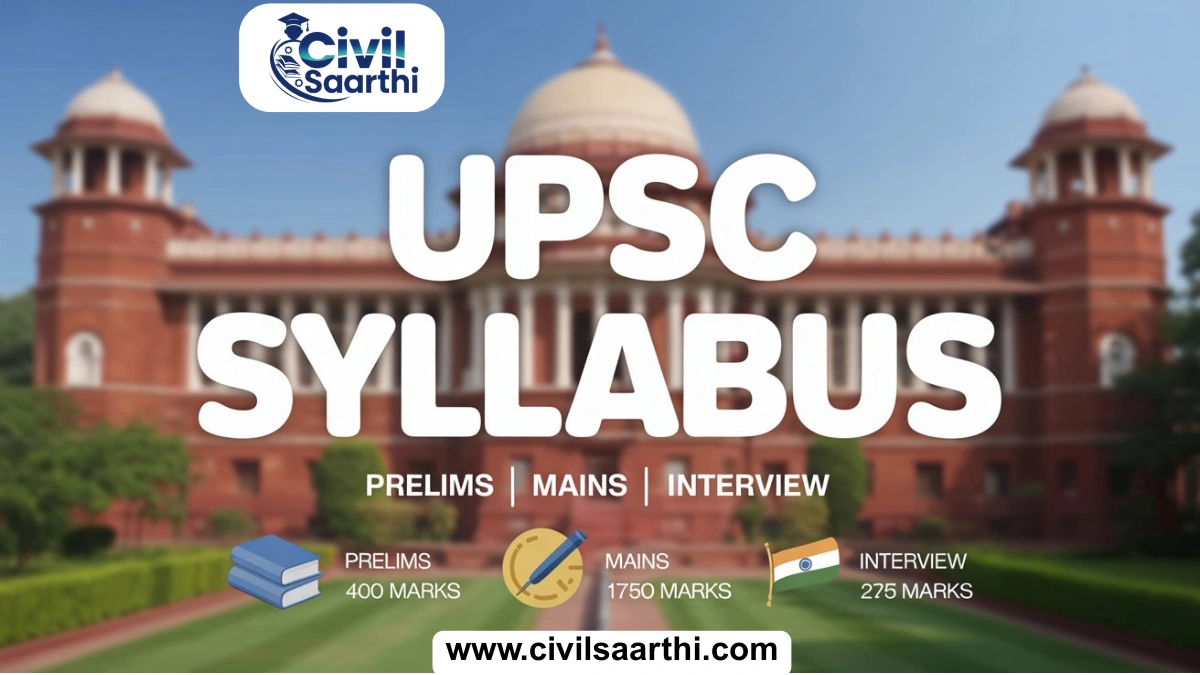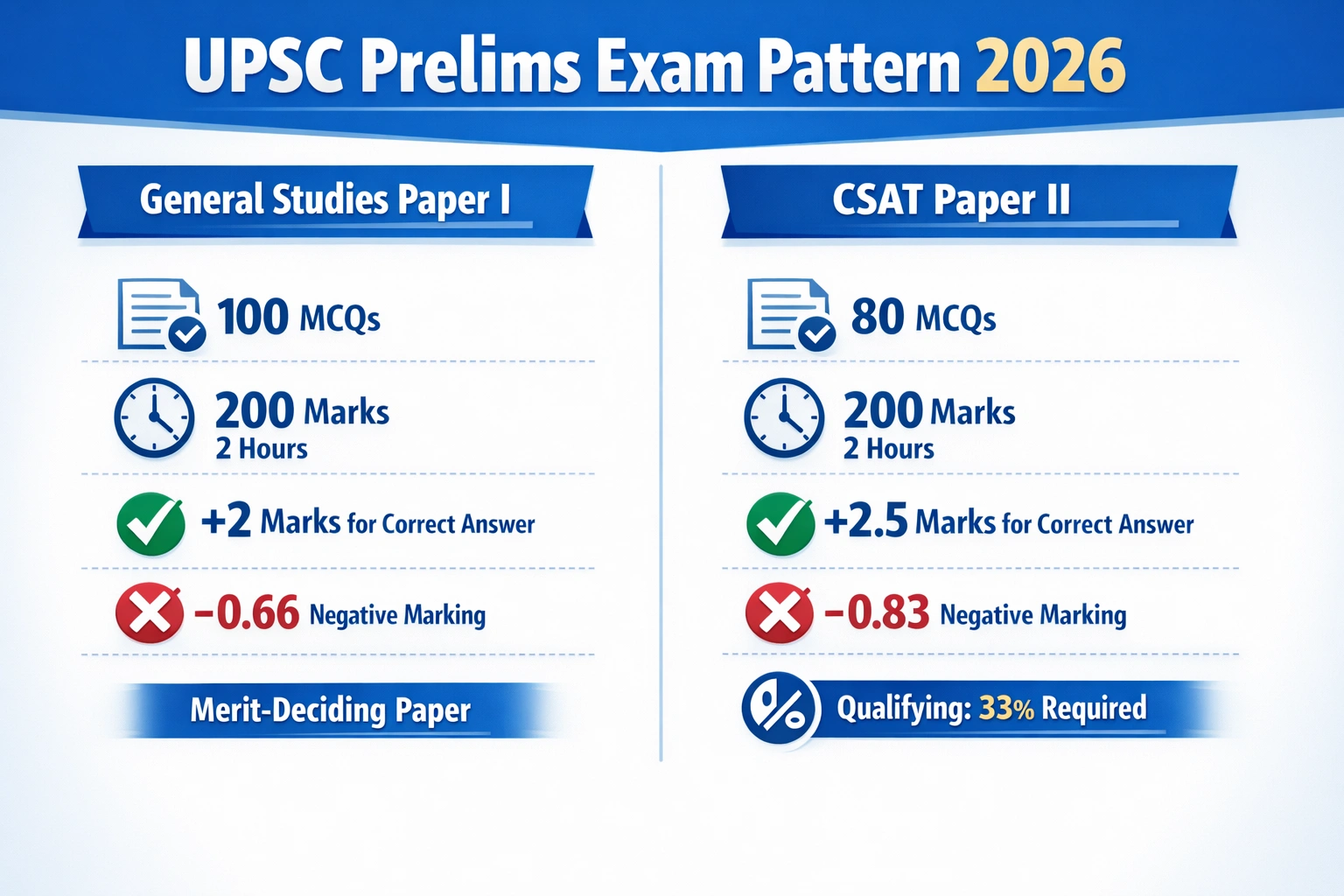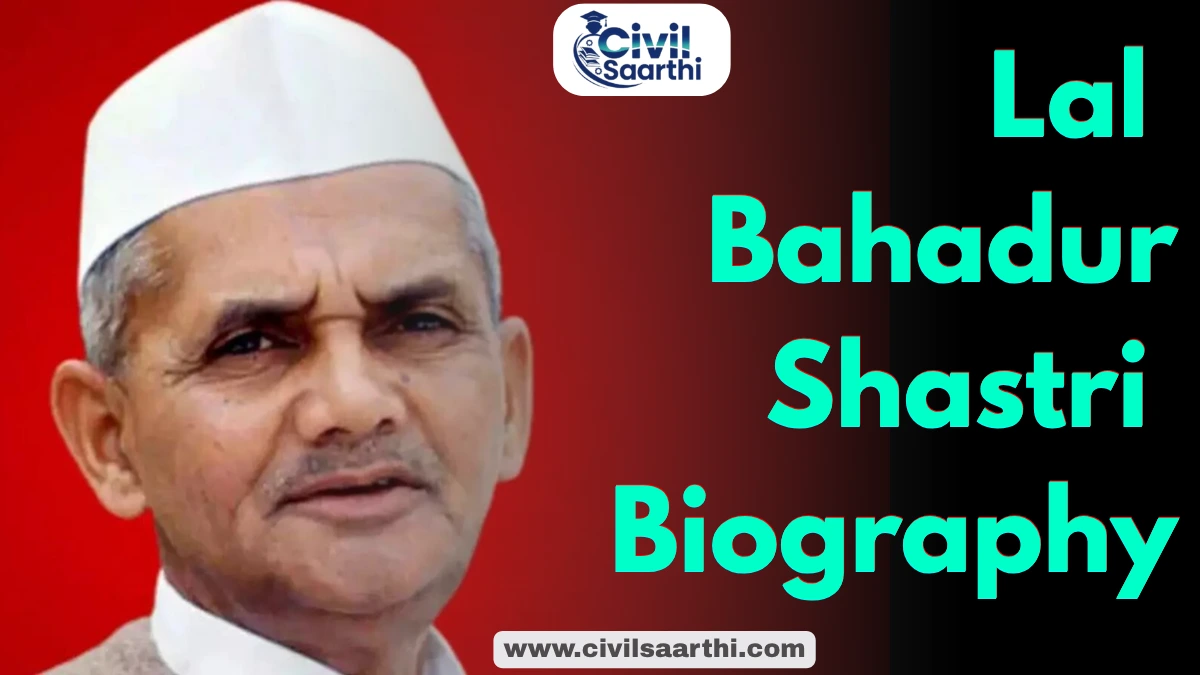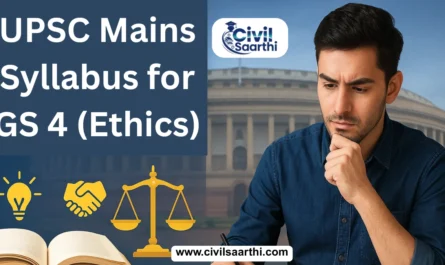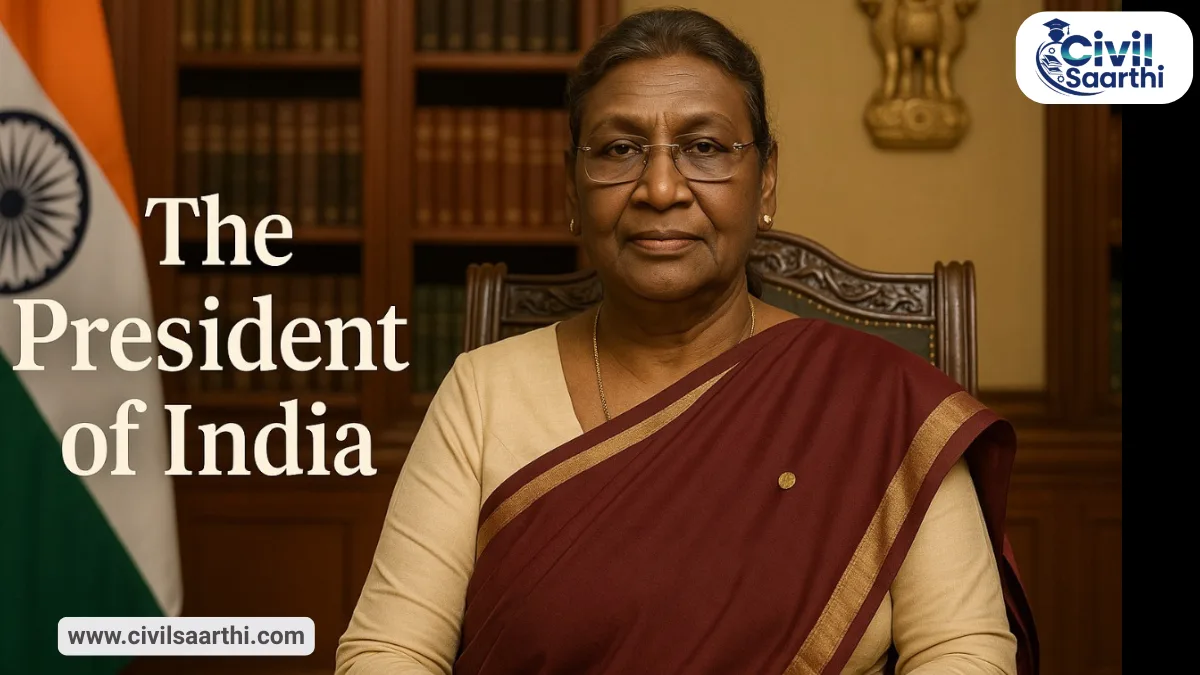The UPSC Civil Services Examination (CSE) 2026 is India’s most competitive exam, conducted by the Union Public Service Commission to recruit IAS, IPS, IFS, IRS, and other Group A & B officers. The exam is divided into three stages: Prelims, Mains, and Interview. Understanding the official UPSC Syllabus 2026 is the first and most important step for aspirants. Below you’ll find a detailed syllabus for both Prelims and Mains, along with an overview table, preparation tips, booklist, and PDF option.
UPSC Syllabus 2026 Overview
The UPSC Syllabus 2026 is designed to test a candidate’s knowledge, analytical skills, and aptitude for governance through Prelims, Mains, and Interview stages.
| Stage | Papers | Nature | Marks | Purpose |
|---|---|---|---|---|
| Prelims | 2 Papers (GS I & CSAT) | Objective (MCQs) | 400 (200 each) | Screening test; marks not counted for final rank |
| Mains | 9 Papers (Essay, 4 GS, 2 Optional, 2 Qualifying) | Descriptive | 1750 (excluding qualifying papers) | Core evaluation for merit |
| Interview | Personality Test | Oral | 275 | Tests personality, judgment, awareness |
| Total | Prelims (Qualifying) + Mains + Interview | – | 2025 marks | Final ranking |
UPSC Syllabus 2026 PDF Download
The complete UPSC Syllabus PDF for Prelims & Mains is shared below for easy reference. It covers Prelims GS Paper I, CSAT (GS Paper II), and Mains Papers I–IV (General Studies) in a structured manner. Aspirants can use this compiled syllabus as a checklist during preparation to ensure full coverage.
Download UPSC Prelims Syllabus 2026 PDF Click here
Download UPSC Mains Syllabus 2026 PDF Click here
UPSC Syllabus Detailed Subject-wise Microtopics PDF Download
The UPSC syllabus covers a wide range of subjects including History, Geography, Polity, Economy, Environment, Science & Technology, Art & Culture, International Relations, Ethics, and Current Affairs, each divided into detailed microtopics. It emphasizes conceptual clarity, analytical understanding, and application-based knowledge through events, schemes, laws, reforms, and global developments. The link to download the PDF has been shared below.
Click here to download UPSC Syllabus Detailed Subject-wise Microtopics
Download Free UPSC NCERT Books PDF Click here
UPSC Prelims Exam Pattern 2026
The UPSC Civil Services Preliminary Examination 2026 is the first screening stage of the Civil Services Examination. It consists of two objective-type papers conducted on the same day to shortlist candidates for the Mains examination.
| Paper | Name of Paper | No. of Questions | Total Marks | Duration | Nature |
|---|---|---|---|---|---|
| Paper I | General Studies (GS) | 100 | 200 | 2 Hours | Merit-based |
| Paper II | CSAT (Aptitude Test) | 80 | 200 | 2 Hours | Qualifying (33%) |
UPSC Syllabus for GS Paper I – General Studies (200 Marks)
This paper tests a candidate’s general awareness about India and the world, covering current events, history, geography, polity, economy, environment, and science. It is the most crucial part of UPSC Prelims, as its marks decide qualification for Mains.
Syllabus Topics:
- Current events of national and international importance
- History of India and Indian National Movement
- Indian and World Geography – Physical, Social, Economic Geography of India and the World
- Indian Polity and Governance – Constitution, Political System, Panchayati Raj, Public Policy, Rights Issues
- Economic and Social Development – Sustainable Development, Poverty, Inclusion, Demographics, Social Sector Initiatives
- General issues on Environmental Ecology, Biodiversity and Climate Change (no subject specialization required)
- General Science
UPSC Syllabus for GS Paper II – CSAT (General Studies II – 200 Marks, Qualifying)
The UPSC CSAT Syllabus for Prelims has 80 questions of 2.5 marks each, totaling 200 marks, with 66.66 marks (33%) as the qualifying cut-off. It tests comprehension, logical reasoning, decision-making, numeracy, and data interpretation, with 1/3rd negative marking for wrong answers.
Syllabus Topics:
- Comprehension
- Interpersonal skills including communication skills
- Logical reasoning and analytical ability
- Decision-making and problem-solving
- General mental ability
- Basic numeracy (Class X level – numbers, relations, orders of magnitude, etc.)
- Data interpretation (charts, graphs, tables, data sufficiency – Class X level)
UPSC Mains Exam Pattern 2026
The UPSC Civil Services Mains Examination 2026 is the second stage of the selection process and consists of descriptive-type papers. It evaluates a candidate’s in-depth understanding, analytical ability, and writing skills across various subjects.
- Total Merit Marks (Mains): 1750
- Qualifying Marks: Paper A & B (minimum required, not counted in merit)
- Optional Subject: One subject with two papers chosen by the candidate
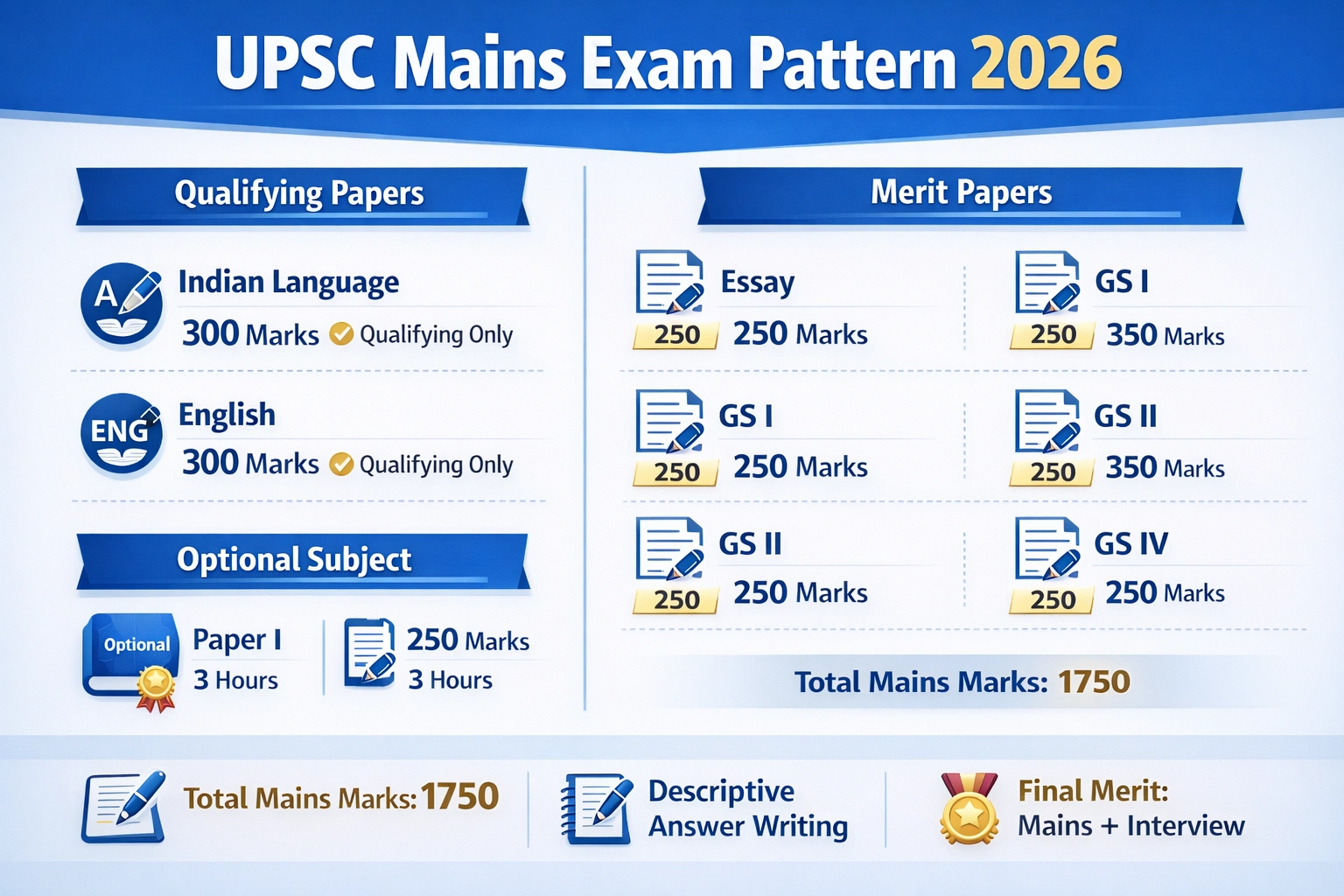
| Paper | Subject | Marks | Duration | Nature |
|---|---|---|---|---|
| Paper A | Indian Language (as per Schedule VIII) | 300 | 3 Hours | Qualifying |
| Paper B | English | 300 | 3 Hours | Qualifying |
| Paper I | Essay | 250 | 3 Hours | Merit-based |
| Paper II | General Studies I | 250 | 3 Hours | Merit-based |
| Paper III | General Studies II | 250 | 3 Hours | Merit-based |
| Paper IV | General Studies III | 250 | 3 Hours | Merit-based |
| Paper V | General Studies IV | 250 | 3 Hours | Merit-based |
| Paper VI | Optional Subject – Paper 1 | 250 | 3 Hours | Merit-based |
| Paper VII | Optional Subject – Paper 2 | 250 | 3 Hours | Merit-based |
UPSC Mains Syllabus 2026 – Official
The UPSC Mains Syllabus 2026 consists of 9 descriptive papers out of which 2 are qualifying (English & Indian Language) and 7 are counted for merit. These include Essay, 4 General Studies papers, and 2 Optional subject papers, together forming the core of the written examination.
Qualifying Papers
Paper A: Indian Language (Any one from the Eighth Schedule, 300 Marks)
Paper B: English (300 Marks)
(Minimum qualifying marks: 25% in each)
Structure of the language papers:
The types of questions asked are –
- Essay – 100 marks
- Reading comprehension – 60 marks
- Precis Writing – 60 marks
- Translation:
- English to compulsory language (e.g. Hindi) – 20 marks
- Compulsory language to English – 20 marks
- Grammar and basic language usage – 40 marks
The rest of the seven papers can be written in any of the languages mentioned under the Eighth Schedule of the Constitution of India or in English.
The aim of the papers is to test the candidates’ ability to read and understand serious discursive prose and to express ideas clearly and correctly, in English and Indian language concerned. The pattern of questions would broadly be as follows :
(i) Comprehension of given passages.
(ii) Precis Writing.
(iii) Usage and Vocabulary.
(iv) Short Essays.
Indian Languages:-
(i) comprehension of given passages.
(ii) Precis Writing.
(iii) Usage and Vocabulary.
(iv) Short Essays.
(v) Translation from English to the Indian Language and vice-versa.
Also Read: UPSC Preparation Strategy After 12th
Papers Counted for Merit
| Paper | Subject | Marks | Duration |
|---|---|---|---|
| Essay | Essay Writing | 250 | 3 Hours |
| GS Paper I | Indian Heritage & Culture, History, Geography of the World & Society | 250 | 3 Hours |
| GS Paper II | Governance, Constitution, Polity, Social Justice & International Relations | 250 | 3 Hours |
| GS Paper III | Technology, Economic Development, Biodiversity, Environment, Security & Disaster Management | 250 | 3 Hours |
| GS Paper IV | Ethics, Integrity & Aptitude (includes case studies) | 250 | 3 Hours |
| Optional Paper I | Candidate’s Chosen Subject | 250 | 3 Hours |
| Optional Paper II | Candidate’s Chosen Subject | 250 | 3 Hours |
Total (Merit Papers) = 1750 Marks
Interview / Personality Test = 275 Marks
Grand Total = 2025 Marks
UPSC Mains Syllabus 2026 for GS Paper 1 (Paper II)
- Indian culture will cover the salient aspects of Art Forms, literature and Architecture from ancient to modern times.
- Modern Indian history from about the middle of the eighteenth century until the present- significant events, personalities, issues.
- The Freedom Struggle – its various stages and important contributors/contributions from different parts of the country.
- Post-independence consolidation and reorganization within the country.
- History of the world will include events from 18th century such as industrial revolution, world wars, redrawal of national boundaries, colonization, decolonization, political philosophies like communism, capitalism, socialism etc.- their forms and effect on the society.
- Salient features of Indian Society, Diversity of India.
- Role of women and women’s organization, population and associated issues, poverty and developmental issues, urbanization, their problems and their remedies.
- Effects of globalization on Indian society.
- Social empowerment, communalism, regionalism & secularism.
- Salient features of world’s physical geography.
- Distribution of key natural resources across the world (including South Asia and the Indian sub-continent); factors responsible for the location of primary, secondary, and tertiary sector industries in various parts of the world (including India).
- Important Geophysical phenomena such as earthquakes, Tsunami, Volcanic activity, cyclone etc., geographical features and their location-changes in critical geographical features (including water-bodies and ice-caps) and in flora and fauna and the effects of such changes.
UPSC Mains Syllabus 2026 for GS Paper 2 (Paper III)
- Indian Constitution-historical underpinnings, evolution, features, amendments, significant provisions and basic structure.
- Functions and responsibilities of the Union and the States, issues and challenges pertaining to the federal structure, devolution of powers and finances up to local levels and challenges therein.
- Separation of powers between various organs dispute redressal mechanisms and institutions.
- Comparison of the Indian constitutional scheme with that of other countries.
- Parliament and State legislatures-structure, functioning, conduct of business, powers & privileges and issues arising out of these.
- Structure, organization and functioning of the Executive and the Judiciary-Ministries and Departments of the Government; pressure groups and formal/informal associations and their role in the Polity.
- Salient features of the Representation of People’s Act.
- Appointment to various Constitutional posts, powers, functions and responsibilities of various Constitutional Bodies.
- Statutory, regulatory and various quasi-judicial bodies.
- Government policies and interventions for development in various sectors and issues arising out of their design and implementation.
- Development processes and the development industry -the role of NGOs, SHGs, various groups and associations, donors, charities, institutional and other stakeholders.
- Welfare schemes for vulnerable sections of the population by the Centre and States and the performance of these schemes; mechanisms, laws, institutions and Bodies constituted for the protection and betterment of these vulnerable sections.
- Issues relating to development and management of Social Sector/Services relating to Health, Education, Human Resources.
- Issues relating to poverty and hunger.
- Important aspects of governance, transparency and accountability, e-governance- applications, models, successes, limitations, and potential; citizens charters, transparency & accountability and institutional and other measures.
- Role of civil services in a democracy.
- India and its neighborhood- relations.
- Bilateral, regional and global groupings and agreements involving India and/or affecting India’s interests.
- Effect of policies and politics of developed and developing countries on India’s interests, Indian diaspora.
- Important International institutions, agencies and fora – their structure, mandate.
UPSC Mains Syllabus 2026 for GS Paper 3 (Paper IV)
- Indian Economy and issues relating to planning, mobilization, of resources, growth, development and employment.
- Inclusive growth and issues arising from it.
- Government Budgeting.
- Major crops-cropping patterns in various parts of the country, – different types of irrigation and irrigation systems storage, transport and marketing of agricultural produce and issues and related constraints; e-technology in the aid of farmers.
- Issues related to direct and indirect farm subsidies and minimum support prices; Public Distribution System-objectives, functioning, limitations, revamping; issues of buffer stocks and food security; Technology missions; economics of animal-rearing.
- Food processing and related industries in India- scope’ and significance, location, upstream and downstream requirements, supply chain management.
- Land reforms in India.
- Effects of liberalization on the economy, changes in industrial policy and their effects on industrial growth.
- Infrastructure: Energy, Ports, Roads, Airports, Railways etc.
- Investment models.
- Science and Technology- developments and their applications and effects in everyday life.
- Achievements of Indians in science & technology; indigenization of technology and developing new technology.
- Awareness in the fields of IT, Space, Computers, robotics, Nano-technology, bio-technology and issues relating to intellectual property rights.
- Conservation, environmental pollution and degradation, environmental impact assessment.
- Disaster and disaster management.
- Linkages between development and spread of extremism.
- Role of external state and non-state actors in creating challenges to internal security.
- Challenges to internal security through communication networks, role of media and social networking sites in internal security challenges, basics of cyber security; money-laundering and its prevention.
- Security challenges and their management in border areas – linkages of organized crime with terrorism.
- Various Security forces and agencies and their mandate.
UPSC Mains Syllabus 2026 for GS Paper 4 (Paper V)
- Ethics and Human Interface: Essence, determinants and consequences of Ethics in-human actions; dimensions of ethics; ethics – in private and public relationships. Human Values – lessons from the lives and teachings of great leaders, reformers and administrators; role of family society and educational institutions in inculcating values.
- Attitude: content, structure, function; its influence and relation with thought and behaviour; moral and political attitudes; social influence and persuasion.
- Aptitude and foundational values for Civil Service, integrity, impartiality and non-partisanship, objectivity, dedication to public service, empathy, tolerance and compassion towards the weaker-sections.
- Emotional intelligence-concepts, and their utilities and application in administration and governance.
- Contributions of moral thinkers and philosophers from India and world.
- Public/Civil service values and Ethics in Public administration: Status and problems; ethical concerns and dilemmas in government and private institutions; laws, rules, regulations and conscience as sources of ethical guidance; accountability and ethical governance; strengthening of ethical and moral values in governance; ethical issues in international relations and funding; corporate governance.
- Probity in Governance: Concept of public service; Philosophical basis of governance and probity; Information sharing and transparency in government, Right to Information, Codes of Ethics, Codes of Conduct, Citizen’s Charters, Work culture, Quality of service delivery, Utilization of public funds, challenges of corruption.
- Case Studies on above issues.
UPSC Optional Syllabus 2026
The UPSC Optional Syllabus 2026 includes 48 subjects, ranging from literature to core disciplines like History, Geography, Public Administration, Political Science, Sociology, and more. Candidates must choose one optional subject with two papers, and the PDF of optional subject syllabi has been shared below for easy access and structured preparation.
UPSC Interview (Personality Test)
The UPSC Interview, or Personality Test, is the last stage of the exam and has 275 marks. It checks how confident, clear, and balanced a candidate is in their answers. The panel looks at qualities like honesty, awareness of current issues, decision-making, and communication skills. It is less about facts and more about the personality and attitude of the candidate.

Also Read: List of Posts in UPSC CSE
UPSC Prelims Preparation Strategy
The Prelims exam is the first stage and acts as a screening test. It needs accuracy, speed, and strong conceptual clarity.
Tips for Prelims:
- Focus on Core Subjects – History, Polity, Economy, Geography, Environment, and Science.
- Revise NCERTs & Standard Books multiple times instead of reading too many sources.
- Current Affairs – Cover at least the last 1–2 years from reliable sources.
- Practice MCQs Daily – Solving 30–50 questions daily improves accuracy.
- Mock Tests & Previous Year Papers – Analyze mistakes and learn elimination techniques.
- CSAT Practice – Don’t ignore CSAT; practice comprehension and aptitude regularly.
- Revision is Key – Keep short notes and revise repeatedly before the exam.
UPSC Mains Preparation Strategy
The Mains exam is descriptive and tests analytical skills, writing ability, and depth of knowledge.
Tips for Mains:
- UPSC Mains Answer Writing Practice – Write answers daily in 150–250 words to improve speed and presentation.
- Use Keywords & Subheadings – Structure answers with clear introduction, body, and conclusion.
- Cover Optional Subject Deeply – Choose an optional wisely and prepare it thoroughly.
- Integrate Current Affairs – Link answers with contemporary events for better scoring.
- Essay Practice – Write 1 essay per week to build flow and balanced arguments.
- Ethics Paper – Use real-life examples, case studies, and quotes.
- Revision of Notes – Revise GS papers multiple times to retain facts and concepts.
- Time Management – Practice writing full-length tests within time limits.
UPSC Syllabus Books 2026
The right set of UPSC books is essential for covering the vast Prelims and Mains syllabus. NCERTs form the base, while standard reference books help in in-depth understanding and answer writing.
Recommended UPSC Booklist
| Subject / Paper | Recommended Books |
|---|---|
| History – Ancient & Medieval | Old NCERTs (R.S. Sharma, Satish Chandra), Tamil Nadu History Texts |
| History – Modern India | Spectrum – Rajiv Ahir, Bipan Chandra’s India’s Struggle for Independence |
| Art & Culture | Nitin Singhania – Indian Art & Culture |
| Geography | NCERTs (6th–12th), GC Leong – Physical Geography, Oxford Atlas |
| Polity | M. Laxmikanth – Indian Polity |
| Economy | Ramesh Singh – Indian Economy, Economic Survey, Budget |
| Environment & Ecology | NCERT Biology (11th–12th), Shankar IAS Environment |
| General Science | NCERTs (6th–10th Science), Current Affairs (Science Reporter, PIB) |
| Current Affairs | The Hindu / Indian Express, Yojana, Kurukshetra, Monthly Compilations |
| Ethics (GS Paper IV) | Lexicon for Ethics, Integrity & Aptitude, Case Study Practice |
| Essay Paper | Previous Year Essay Collections, Newspapers, Vision/Forum compilations |
| Optional Subjects | Standard books vary as per the subject chosen (e.g., Geography, History, Pub Ad) |
UPSC List of Optional Subjects
UPSC List of optional subjects for UPSC Main Examination has been shared bwlow. The optional subjects includes a total of 500 marks with 250 marks in each optional Paper 1 and Paper 2. Candidates who want to prepare for the UPSC Exam 2026 must chooose their optional subjects from the list given below.
- Agriculture
- Animal Husbandry and Veterinary Science
- Anthropology
- Botany
- Chemistry
- Civil Engineering
- Commerce and Accountancy
- Economics
- Electrical Engineering
- Geography
- Geology
- History
- Law
- Management
- Mathematics
- Mechanical Engineering
- Medical Science
- Philosophy
- Physics
- Political Science and International Relations
- Psychology
- Public Administration
- Sociology
- Statistics
- Zoology
- Literature of any one of the following languages: Assamese, Bengali, Bodo, Dogri, Gujarati, Hindi, Kannada, Kashmiri, Konkani, Maithili, Malayalam, Manipuri, Marathi, Nepali, Odia, Punjabi, Sanskrit, Santhali, Sindhi, Tamil, Telugu, Urdu and English.
UPSC Prelims vs Mains – Key Differences
The UPSC Prelims and Mains are very different in terms of exam style, purpose, and evaluation. Prelims is an objective-type screening test, while Mains is a descriptive written exam that decides the merit list.
| Feature | UPSC Prelims | UPSC Mains |
|---|---|---|
| Nature of Exam | Objective (MCQs) | Descriptive (Essay-type answers) |
| Papers | 2 (GS Paper I & CSAT) | 9 Papers (2 Qualifying + 7 Merit-based) |
| Marks | 400 (200 each) | 1750 (Qualifying papers excluded) |
| Purpose | Screening test for Mains eligibility | Determines rank and final selection |
| Negative Marking | Yes, 1/3rd for wrong answers | No negative marking |
| Medium of Exam | English / Hindi | English, Hindi & other Indian languages |
| Syllabus Coverage | General Studies, Current Affairs, CSAT | Essay, GS I-IV, Optional Subject, Ethics, Language papers |
| Result Impact | Marks not counted for final ranking | Marks directly count in final merit |
